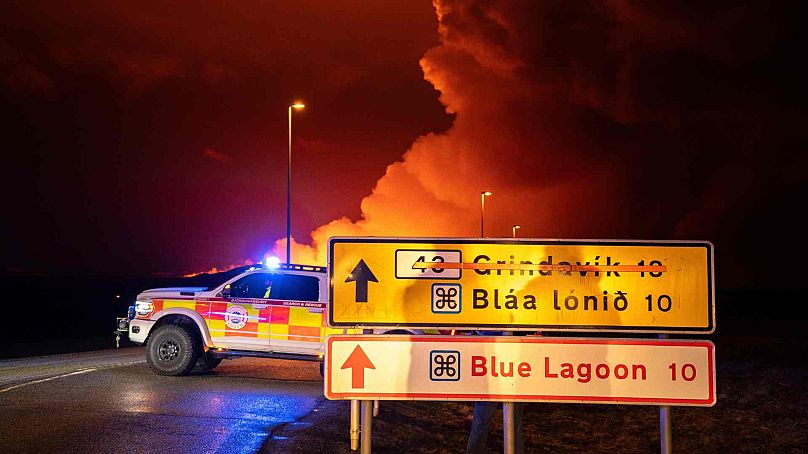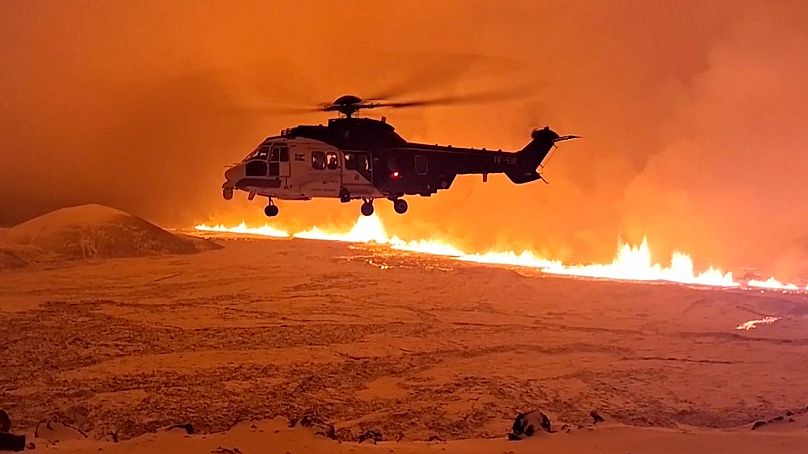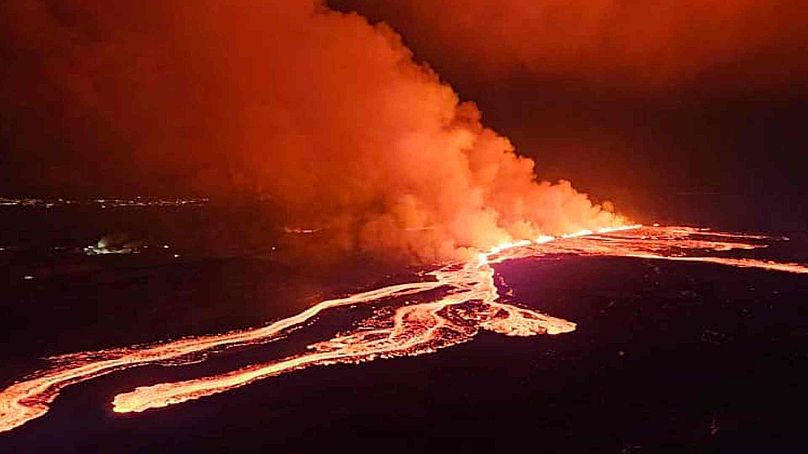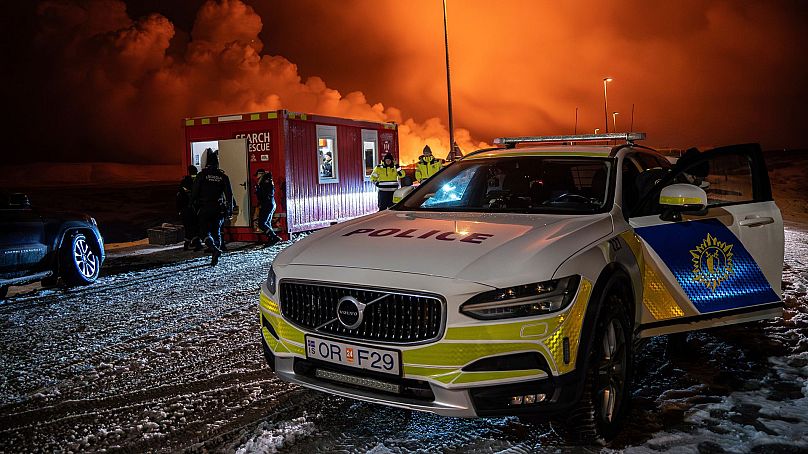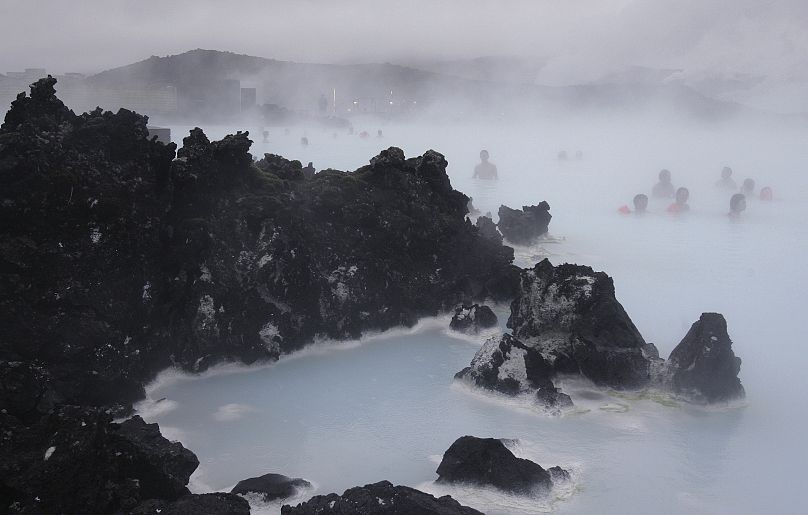A new 3-km fissure has opened up on the Reykjanes Peninsula and lava has reached the Blue Lagoon tourist attraction.
A volcano in Iceland has erupted for the seventh time since December, spewing red lava through a 3-kilometre fissure on the Reykjanes Peninsula.
 ADVERTISEMENT
ADVERTISEMENT
 ADVERTISEMENT
ADVERTISEMENT
The eruption started at 11:14pm on Wednesday with little warning. Lava from the Sundhnúkur fissure was moving at a speed of 100m per hour yesterday, moving further westwards than ever before according to the Icelandic Met Office.
Despite this, the volcanic activity is estimated to be considerably smaller than the last eruption, in August, the Met Office said.
“In the big picture, this is a bit smaller than the last eruption, and the eruption that occurred in May,” Magnús Tumi Guðmundsson, a professor of geophysics who flew over the scene with the Civil Protection agency to monitor the event, told the national RUV broadcaster.
Visitors were evacuated from the Blue Lagoon thermal spa, one of Iceland’s top tourist attractions, and it remains closed.
Despite lying just 20-km north of the eruption site, Keflavik International Airport - Iceland's main international airport - remains open and flights are still arriving and departing.
If you are planning on travelling to or from the affected area, here are the full details on travelling to Iceland right mpw.
How long will Iceland's volcano eruption last?
The Icelandic Meteorological Office have been updating the public on the Reykjanes volcano since the eruption.
They said this eruption does not appear to be as intense as recent activity.
In a statement yesterday, the day after the initial eruption, they said: "Eruptive activity between Stóra-Skógfell and Sýlingarfell appears to be similar to that observed earlier this morning. Seismic activity and deformation at the eruption site remain very low.
The lava flow that crossed Grindavíkurvegur and the hot water pipeline to the west has continued travelling westward. By midday, lava reached the parking lot at the Blue Lagoon and continues to advance."
Before this year's eruptions, the Svartsengi volcanic system north of Grindavik had been dormant for around 780 years. The volcano is just a few kilometres west of Fagradalsfjall, which was dormant for 6,000 years before flaring to life in March 2021.
Grindavík: Has the local town been evacuated?
Yes, the local town of Grindavík has been evacuated.
“Grindavík is not in danger as it looks and it is unlikely that this crack will get any longer, although nothing can be ruled out,” Magnús Tumi said.
The repeated volcanic eruptions close to Grindavík, which is about 50-kilometres southwest of the capital, Reykjavik, and has a population of 3,800 people, have damaged infrastructure and property and forced many residents to move away from the town to guarantee their safety.
The Grindavík community was previously evacuated in December following a series of earthquakes that opened large cracks in the earth between the town and Sýlingarfell, a small mountain to the north.
Iceland's volcano eruption 'is not a tourist attraction'
Tourists often want to see the majestic volcanic eruptions and flock to the site after eruptions.
However authorities have repeatedly warned tourists and locals to stay away from Reykjanes.
“This is not a tourist attraction and you must watch it from a great distance," Vidir Reynisson, head of Iceland’s Civil Protection and Emergency Management, told national broadcaster RUV.
Have flights to Iceland been cancelled?
Despite concerns over the impact the eruption will have on travel, nearby Keflavik Airport is open and flights are arriving and departing as normal.
Icelandic airport operator ISAVIA advises passengers to monitor flight information here.
Volcanic eruptions can pose a serious hazard to air travel as ash released into the atmosphere can cause jet engines to fail, damage flight control systems and reduce visibility.
However, the airport has previously said they are used to volcanic activity and well-prepared to deal with it without needing to close the airport.
Iceland's Civil Protection and Emergency Management said, "Iceland is no stranger to volcanic activity and experiences an average volcanic event every five years.
Icelandic authorities and the public are highly prepared for such events, and Iceland has one of the world’s most effective volcanic preparedness measures.
Iceland’s geoscientists possess vast experience in dealing with volcanic activities."
A major eruption in Iceland in April 2010 caused widespread disruption to air travel between Europe and North America. The quarter of a billion cubic metres of volcanic ash it ejected into the air led to more than 100,000 flights being cancelled over an eight-day period.
Though there had been fears of a repeat, Eyjafjallajokull volcano erupted under circumstances that contributed to the immense size of its ash cloud. A glacier on top of it caused meltwater to rapidly cool the lava, creating tiny particles which were launched into the air by the steam produced in the eruption. These were then carried on the wind towards Europe.
These has been no impact on air travel during any of the recent eruptions.
The European Aviation Safety Agency (EASA) is also better prepared for a major volcanic ash event.
"In the event of an eruption and development of an ash cloud, the agency will work with other aviation actors to assess the impact for aviation and make recommendations accordingly," a statement on the EASA's website from last year reads.
Is it safe to travel to Iceland?
Yes, Iceland remains a safe destination.
In a statement the Icelandic Met Office said:
"Iceland is no stranger to volcanic activity and experiences an average volcanic event every five years. Icelandic authorities and the public are highly prepared for such events, and Iceland has one of the world’s most effective volcanic preparedness measures. Iceland’s geoscientists possess vast experience in dealing with volcanic activities."
Travellers are advised to stay away from Grindavík and respect local restrictions. Visit the Icelandic Met Office and Safe Travel Iceland for the latest advice.
Otherwise, Iceland is currently a safe destination.
Keflavik International Airport and the road to it is unaffected and operating normally.
Countries have not issued a ‘no-go’ travel warning for Iceland meaning that airlines and holiday companies are operating as normal and travellers who cancel their bookings have no automatic right to a refund.
During a previous eruption Jonathan Frankham, general manager of travel insurance company World Nomads, said: “For those concerned about travel insurance coverage, and whether cancelling a trip is best, we’d advise travellers to exercise common sense and travel wisely," says
"It’s important to note that policies purchased after the earthquakes and consequential volcanic eruption became a 'known event' are unlikely to be covered, but we recommend checking your policy wording for exact details."
He advised tourists to contact their airline or travel provider for assistance and the latest information.
Is the Blue Lagoon open?
The Blue Lagoon geothermal spa - one of Iceland’s biggest tourist attractions - was evacuated when the volcanic eruption began.
Lava has now reached the Blue Lagoon's car park.
The spa is still closed, according to the official website, and will remain closed until Sunday 24 November.
The situation is being continually assessed to decide when the attraction can reopen safely.
The Blue Lagoon released a statement saying, "Due to a volcanic eruption that commenced in Sundhnúksgígar on November 20, we took the precautionary measure of evacuating and temporarily closing all our operational units.
Blue Lagoon will be closed through Sunday, November 24, at which time the situation will be reassessed."
Blue Lagoon management said that all customers with bookings would be contacted, and anyone wishing to change or cancel their booking can do so on the official website.
Watch the video above to see the Reykjanes volcano in action.











